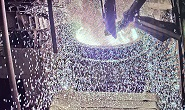Prices

April 11, 2022
Voestalpine Looks to Sell Majority Stake in Texas HBI Plant
Written by David Schollaert
Voestalpine is in advanced talks to sell a majority stake in its hot-briquetted iron (HBI) plant in southern Texas, the company said. “In recent months, Voestalpine has been conducting an open-ended market sounding to stabilize the business model of its direct reduction plant in Corpus Christi, Texas.”
The Austrian specialty steelmaker didn’t disclose a potential sales price but said negotiations to sell 80% of its shares were at an “advanced stage,” in a press release on Sunday, April 10.
Its desire to establish a strategic partner for its $740 million facility is no surprise. Voestalpine consumes only some of its 2 million ton-per-year HBI capacity, shipping roughly 40% to its mills in Linz and Donawitz, Austria. The remaining 60% is marketed to outside customers, according to the steelmaker’s website.
And Voestalpine said it would continue to take some material from the Texas HBI plant even after a sale. “Part of voestalpine’s further participation is to be an agreement on the long-term securing of the HBI volume required in the future for the first decarbonisation step at the sites in Linz and Donawitz,” the company said.
The HBI plant has benefited from “good demand for steel in North America” during the first three quarters of the Voestalpine’s 2021-22 reporting year. But the facility faced cost overruns due to construction setbacks, and an impairment loss of 163 million euros in its 2020-21 reporting year because of “sharply lower” demand.
The facility – which is actually located in Portland, Texas, just outside of Corpus Christi – originally had a four-year offtake agreement with electric-arc furnace (EAF) steelmaker Big River Steel, now a part of US Steel. The deal was for 240,000 tons per year of HBI, per the company’s website. It’s not clear whether that agreement is still in place.
US Steel did not immediately respond to a request for comment.
Alternative metallics such as HBI, direct-reduced iron (DRI) and pig iron are key feedstocks for EAF sheet mills. That’s because purer iron units are critical to produce more advanced grades of steel. And alternatives to prime scrap are necessary because scrap supplies are expected to become tight as more EAF steelmaking capacity comes online both in the US and abroad.
And the situation has become more urgent with the war in Ukraine. The US had sourced most of its pig iron from Brazil, Russia and Ukraine. The war means that supplies from the latter two are not as dependable as they had been.
Also of note, Steel Dynamics Inc.’s (SDI) new 3-million-ton-per year EAF flat-rolled steel mill in Sinton, Texas, is less than 20 miles from Voestalpine’s HBI plant.
By David Schollaert, David@SteelMarketUpdate.com







